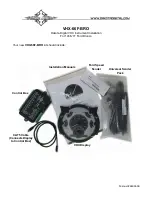
17
EN
6. TECHNICAL SPECIFICATIONS
GENERAL INFORMATION
94121x rechargeable Nickel-metal hydride (NiMH) battery (4.8 V / ≥ 1200 mA/h).
Battery chargers: only battery chargers with the part number 6830xx can be used to recharge the batteries
supplied with the stimulator.
Product and accessories (excluded battery) expected service life: 5 years
Electrode shelf life: refer to electrodes bag
NEUROSTIMULATION
All the electrical specifications are supplied with an impedance from 500 to 1000 ohms per channel.
Channels: four independent and individually adjustable channels, electrically isolated from each other.
Impulsion form: constant rectangular current with pulse compensation to eliminate any direct current
component to prevent residual polarisation at skin level.
Maximum pulse intensity: 120 mA.
Pulse intensity increments: manual adjustment of stimulation intensity from 0 to 999 (energy) by minimum
increments of 0.5 mA.
Pulse amplitude: from 60 to 400 μs.
Maximum electrical charge per pulse: 96 microcoulombs (2 x 48 μC, compensated).
Standard pulse ramp-up time: 3 μs (20 %-80 % of maximum current).
Pulse frequency: 1 to 150 Hz.
INFORMATION ABOUT ELECTROMAGNETIC COMPATIBILITY (EMC)
The stimulator is designed to be used in typical domestic environments approved in accordance with the
safety standard EMC EN 60601-1-2.
This device emits very low levels in the radio frequency (RF) interval and is therefore not likely to cause
interference with nearby electronic equipment (radios, computers, telephones, etc.).
The stimulator is designed to withstand foreseeable disturbances originating from electrostatic discharge,
magnetic fields from the power supply or radio frequency emitters.
However, it is not possible to guarantee that the stimulator will not be affected by powerful RF (radio
frequency) fields originating, for example, from mobile phones.
For more detailed information about electromagnetic emissions and immunity, please contact Compex.
Summary of Contents for Cross Training
Page 2: ...INSTRUCTION FOR USE...
Page 25: ...MODE D EMPLOI...
Page 48: ...ANWEISUNGEN...
Page 71: ...ISTRUZIONI...
Page 94: ...INSTRUCCIONES...
Page 117: ...INSTRUCTIES...
Page 140: ...INSTRU ES...
Page 163: ...BRUKSANVISNING...
















































